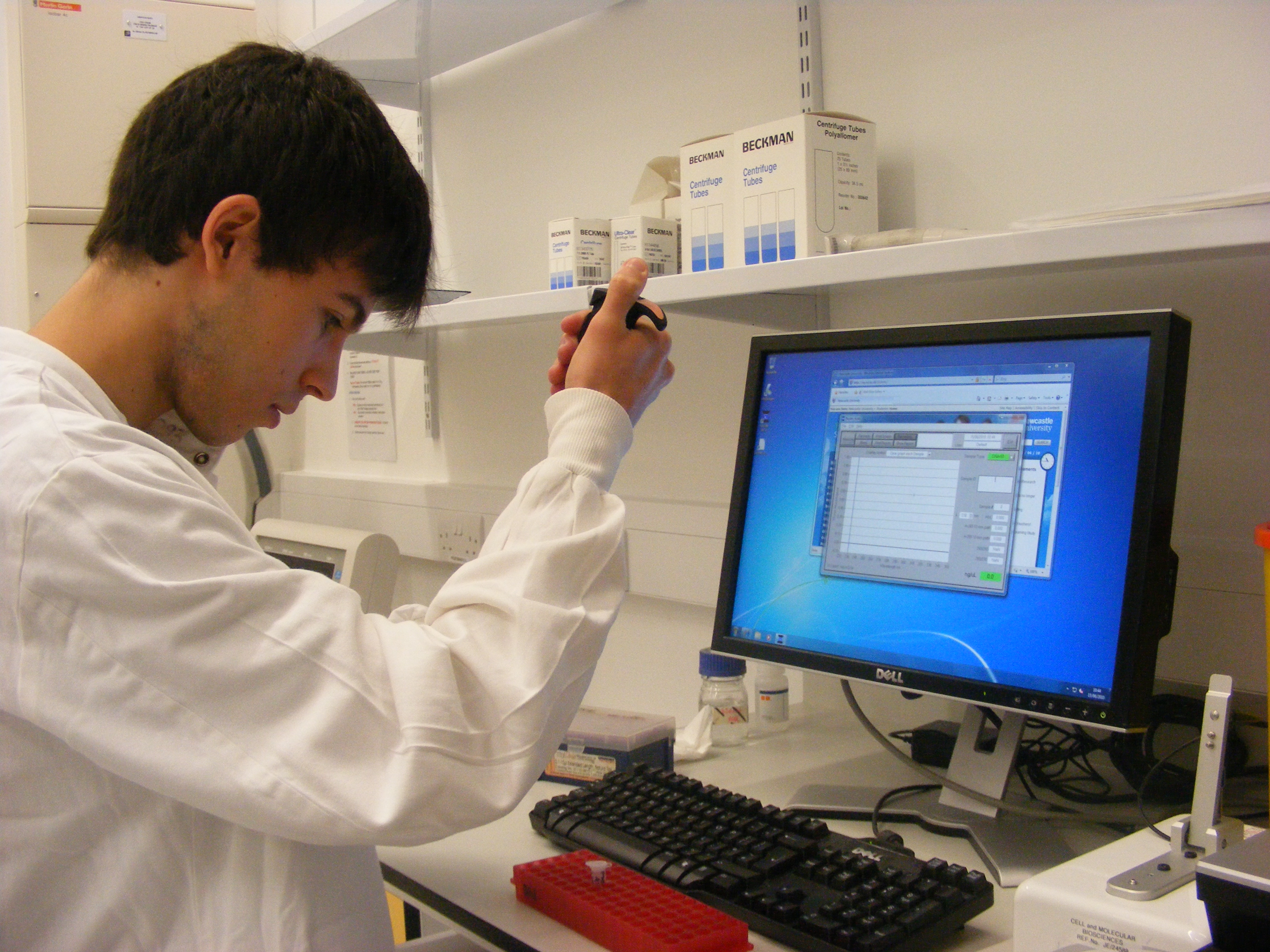Team:Newcastle/15 June 2010
From 2010.igem.org
Shethharsh08 (Talk | contribs) (→Protocol) |
|||
| (41 intermediate revisions not shown) | |||
| Line 1: | Line 1: | ||
| - | + | {{Team:Newcastle/mainbanner}} | |
| - | + | '''15 June 2010''' | |
| - | + | =Miniprep Kit Using a Microcentrifuge= | |
| - | + | ||
| - | + | ||
| - | + | ||
| - | + | ||
| - | + | ||
| - | + | ||
| - | + | ||
| - | '' | + | ==Aim== |
| + | To familiarise us to the technique of extracting plasmid DNA from ''E. coli'' DH5α cells by using a Miniprep kit from Qiagen. | ||
| - | + | ==Protocol== | |
| + | Please refer to [[Team:Newcastle/Qiagen Minipreps|Qiagen Minipreps]] protocol. | ||
| - | # Make up 1% agarose gel (1g of agarose in | + | =Nanodrop= |
| - | # Wait for | + | |
| - | # Transfer harden gel into the gel tank and add TAE buffer until the gel is completely | + | ==Aim== |
| - | # Depending on the nature of the sample, 3μl of GeneRuler™ 1kb Plus DNA Ladder was used for analysing DNA | + | To allow us to accurately measure the purity of DNA that has been extracted from ''E. coli'' DH5α cells using the Qiagen Midiprep kit. |
| - | # | + | |
| + | ==Protocol== | ||
| + | |||
| + | [[Image:Newcastle_Week_1_lab.JPG|300px|Steven trying out the nanodrop machine]] | ||
| + | |||
| + | '''Figure 1''': Steven trying out the nanodrop machine. | ||
| + | |||
| + | Please refer to: [[TeamNewcastleNanoDrop Spectrophotometer| Nanodrop Spectrophotometer]] protocol. | ||
| + | |||
| + | =DNA Restriction Digestion= | ||
| + | |||
| + | ==Aim== | ||
| + | DNA digestion is a technique that allow us to cut DNA at specific sites known as recognition sites which can be 4, 6 or 8 bp long. Therefore by running the digested plasmid or DNA on an agarose gel using gel electrophoresis, we will be able to correctly see the size of the DNA. | ||
| + | |||
| + | ==Protocol== | ||
| + | |||
| + | Digestion was performed by using EcoRI and PstI as the prefix and suffix of the BBa_04450 biobrick. | ||
| + | |||
| + | # 20 μl solution should be made in total: 15 μl plasmid (with GFP/RFP), 1 μl EcoRI, 1 μl PstI, 2 μl Buffer (10x), 1 μl water. '''NOTE:''' Digestive enzymes should never exceed 10% of the total volume. | ||
| + | # Add the reagents in this order: | ||
| + | ##plasmid, | ||
| + | ##water, | ||
| + | ##buffer and | ||
| + | ##enzymes | ||
| + | # Centrifuge for a few seconds to make sure that the mixture is at the bottom. | ||
| + | # Heat block for 2 hours at 37°C. | ||
| + | |||
| + | =Gel electrophoresis= | ||
| + | |||
| + | ==Aims== | ||
| + | Gel electrophoresis allow us to separate DNA, RNA, or protein molecules by molecular weight using an electric field applied to a gel matrix after the restriction digestion step (this step is only for DNA and RNA). | ||
| + | |||
| + | ==Protocol== | ||
| + | # Make up 1% agarose gel (1g of agarose in 100 ml of TAE buffer) and transfer 60 ml of molten agarose gel into the gel tray after adding 3 μl of Safeview. | ||
| + | # Wait for 30 minutes to allow the gel to harden. | ||
| + | # Transfer harden gel into the gel tank and add TAE buffer until the gel is completely submerged. | ||
| + | # Depending on the nature of the sample, 3μl of GeneRuler™ 1kb Plus DNA Ladder was used for analysing the size of the DNA. | ||
| + | # Loading buffer was then added together with the sample before loading onto the gel matrix. | ||
| + | # Run gel at 90V until separation is achieved and visualize using the gelDoc apparatus. | ||
| + | |||
| + | {{Team:Newcastle/footer}} | ||
Latest revision as of 20:47, 21 October 2010

| |||||||||||||
| |||||||||||||
15 June 2010
Contents |
Miniprep Kit Using a Microcentrifuge
Aim
To familiarise us to the technique of extracting plasmid DNA from E. coli DH5α cells by using a Miniprep kit from Qiagen.
Protocol
Please refer to Qiagen Minipreps protocol.
Nanodrop
Aim
To allow us to accurately measure the purity of DNA that has been extracted from E. coli DH5α cells using the Qiagen Midiprep kit.
Protocol
Figure 1: Steven trying out the nanodrop machine.
Please refer to: Nanodrop Spectrophotometer protocol.
DNA Restriction Digestion
Aim
DNA digestion is a technique that allow us to cut DNA at specific sites known as recognition sites which can be 4, 6 or 8 bp long. Therefore by running the digested plasmid or DNA on an agarose gel using gel electrophoresis, we will be able to correctly see the size of the DNA.
Protocol
Digestion was performed by using EcoRI and PstI as the prefix and suffix of the BBa_04450 biobrick.
- 20 μl solution should be made in total: 15 μl plasmid (with GFP/RFP), 1 μl EcoRI, 1 μl PstI, 2 μl Buffer (10x), 1 μl water. NOTE: Digestive enzymes should never exceed 10% of the total volume.
- Add the reagents in this order:
- plasmid,
- water,
- buffer and
- enzymes
- Centrifuge for a few seconds to make sure that the mixture is at the bottom.
- Heat block for 2 hours at 37°C.
Gel electrophoresis
Aims
Gel electrophoresis allow us to separate DNA, RNA, or protein molecules by molecular weight using an electric field applied to a gel matrix after the restriction digestion step (this step is only for DNA and RNA).
Protocol
- Make up 1% agarose gel (1g of agarose in 100 ml of TAE buffer) and transfer 60 ml of molten agarose gel into the gel tray after adding 3 μl of Safeview.
- Wait for 30 minutes to allow the gel to harden.
- Transfer harden gel into the gel tank and add TAE buffer until the gel is completely submerged.
- Depending on the nature of the sample, 3μl of GeneRuler™ 1kb Plus DNA Ladder was used for analysing the size of the DNA.
- Loading buffer was then added together with the sample before loading onto the gel matrix.
- Run gel at 90V until separation is achieved and visualize using the gelDoc apparatus.
 
|
 "
"
